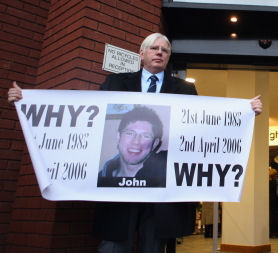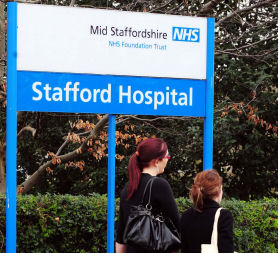Stafford Hospital public inquiry begins
A public inquiry begins into the ‘appalling’ standards of care at Stafford hospital, which are believed to have caused hundreds of deaths. But not every official will give evidence, says Darsha Soni.

The start of the long-awaited inquiry was delayed as an angry relative staged a protest at the Stafford Borough Council offices.
Will O’Neil, whose father died while he was being treated by Mid Staffordshire NHS Foundation Trust, disrupted the start of proceedings when he refused to leave a barrister’s seat.
Cure the NHS campaigner Julie Bailey, whose mother died at Stafford Hospital, said Mr O’Neil felt he was being “left out of the process”.
“He felt that he should be in the main hearing room,” Ms Bailey said.
“This isn’t an ideal situation. Ideally we should all be together but this is best that we could do”.
Some of the victims’ families could only watch the inquiry’s proceedings via a video link from another room.
Mr O’Neil eventually moved and held a private meeting with inquiry chairman Robert Francis QC.
Mr Francis later told the hearing that the public inquiry was a “significant milestone” which would examine why the “terrible standard of service” at Stafford Hospital was allowed to continue.
Campaigners finally won a full public inquiry when the coalition came into power, writes Darshna Soni. The new government has promised that hospitals will face closer scrutiny of death rates.
But, this inquiry will not hear from Stafford's former Chief Executive and that has caused some anger. Martin Yeates is said to be too ill and suffering from Post Traumatic Stress Disorder.
Campaigner Julie Bailey, whose mother died at the hospital, told me she was "extremely disappointed" that Mr Yeates won't be attending.
Other senior managers will be called to give evidence. David Nicholson, now head of the entire NHS, was in charge in this region in 2005.
The current Chief Executive of the Care Quality Commission, Cynthia Bower, had responsibility for measuring quality and safety, from 2006 until 2008.
Relatives say they will be watching their evidence with interest.

He said the inquiry aims to build on the findings of the last inquiry to find out why no action was taken by NHS management before the the Healthcare Commission intervened.
“While we are not here to re-investigate what went wrong in Stafford Hospital, I think it is important… that we keep at the forefront of our minds the terrible effect of the system’s failings on those it was meant to serve,” he said.
It comes after a 2009 report which criticised the hospital’s appalling standards of care. It also found the hospital had between 400 and 1,200 more deaths than expected between 2005 and 2008 as it tried to drive down costs and meet targets.
The previous government ordered a private investigation but rejected calls for a wider public inquiry.
But Health Secretary Andrew Lansley announced the public inquiry in June, saying the families of those who died deserved answers.
Mr Lansley said the inquiry will have the powers to compel witnesses to attend and is hoped to combat “a culture of secrecy” and restore public confidence.
Mr Francis, who also headed the previous inquiry, will begin hearing expert evidence next week.